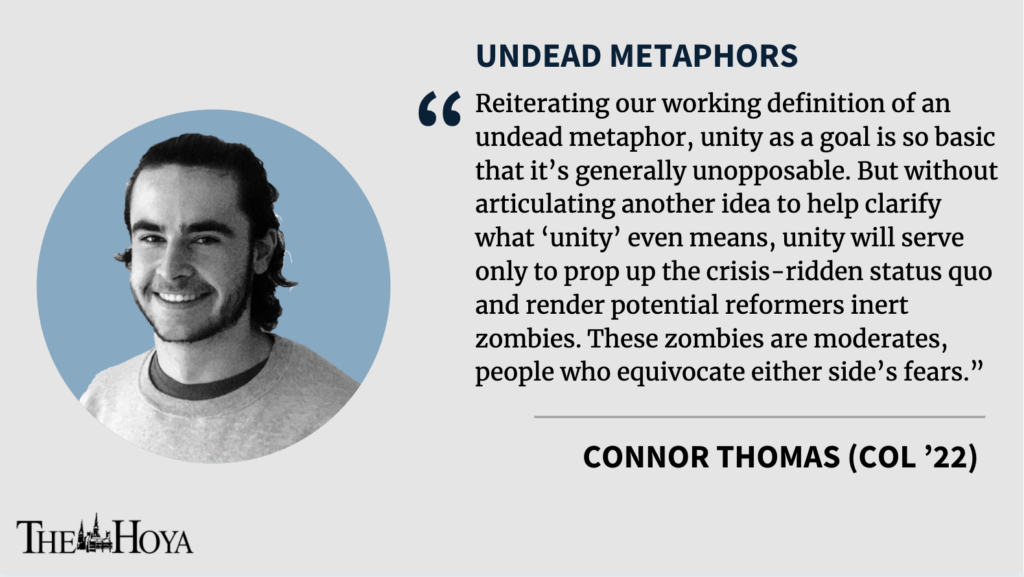Well, it is a whole six weeks into the Biden presidency. Bombed Syria? Check. Stimulus money? Still no check. Bipartisanship? Sailed.
Jokes aside, President Joe Biden’s aspirational unity looks pretty difficult to achieve right now. Democrats refuse to forget the Capitol riot, and Republicans like the Conservative Political Action Conference attendees seem convinced the so-called radical left is reinstituting Soviet-style communism in the United States. Any centrists who read my column and people who think both sides have lost their minds should take this week’s edition to heart.
I can hardly remember a time when this country was not in a state of crisis. Last summer’s protests prompted some cultural changes, but few substantive procedural ones. The mismanaged pandemic will not go away, and my home state of Texas continues to suffer the effects of extreme, unprecedented winter storms, a grave omen for looming climate disaster.
Politically speaking, all this crisis is lighter fluid for fear, an emotion inseparable — problematically so — from this week’s undead metaphor: unity. Reiterating our working definition of an undead metaphor, unity as a goal is so basic that it’s generally unopposable. But without articulating another idea to help clarify what “unity” even means, unity will serve only to prop up the crisis-ridden status quo and render potential reformers inert zombies. These zombies are moderates, people who equivocate when they weigh both side’s fears.
H.P. Lovecraft’s “The Outsider,” an early artifact of American zombie horror worth the quick read, helps us understand how fear can serve as a roadblock to productive unity. Lovecraft’s Outsider grows up in a castle isolated from society, yearning to escape to the outside. When he does, the people he meets find him horrifying. He doesn’t understand why until he sees his reflection in a mirror — he is a walking corpse, having grown up in not a castle but a crypt.
The Outsider responds to others’ disgust not by reasserting his fading humanity but by fully rejecting it. He goes to live with other ghouls rather than finding what he and the others had in common. The first time around, the story can read like a heartwarming tale of accepting one’s own individuality. There’s a catch to the fable, however; it comes from the mind of a virulent racist.
Lovecraft’s horror always focused on material differences in an unfathomable other, equating the alien with the disgusting, arguably sublimating bigotry. Setting aside debates about separating artist and art, this zombie bildungsroman might well be read as an exercise in how not to think. When Lovecraft’s Outsider comes into conflict with others, he flees to the company of those with whom he shares shallow similarities. He found unity by way of fear, but at a cost.
In her far-reaching account of “Political Emotions,” philosopher Martha Nussbaum discusses the necessity, and the danger, of fear in politics. For Nussbaum, fear is a “narrowing emotion.” Fear keeps us on alert for danger, but because fear is rooted in a self-preservatory instinct, it can give us tunnel vision with regard to the good of others. Two qualifiers, then, must direct fear if it is to be helpful: general concern and reasonableness.
General concern and reason prevent us from unifying against an outgroup and channeling fear onto a scapegoat. When politicians forget or ignore general concern, fear turns into kindling for fascistic unity, a recurring process on the historically paranoid right wing.
The fascist wing of the Republican party weaponizes unreasonable fear, along with a cultural rebirth narrative and cult of personality, to unite its voters. I appreciate that the recently founded political advocacy group Gen Z GOP believes in climate change and “balance,” but its members must take extreme action regarding the golden calf that CPAC venerated this year, even if that means drinking it.
Not that moderate Democrats offer a compelling response to our national crises either. Biden’s platform of unity only means finding the middle à la Bruce Springsteen. His inaugural address preached unity and aimed to alleviate fear, but all Biden showed was fear of disunity — a hollow and circular point to rally around, not to mention undemocratic. Asking citizens in a democracy to stop arguing is ridiculously patronizing. To stop arguing and make policy is the politician’s job.
But Biden and Vice President Kamala Harris shy away from their domestic commitments to a living wage because their platform was not productive unity — collectivity — but agreeableness. Their deference to Crown Prince Mohammed bin Salman bears their agreeableness agenda out in foreign policy too. This administration sacrifices too much to narrow-minded bigots, despots and interest groups.
Against Bruce, Biden and Harris, I propose fellow Texan columnist Jim Hightower’s theory that “there’s nothing in the middle of the road but a yellow stripe and dead armadillos.” Fear will not leave our politics any time soon, but reasonable fear and concern might save unity as a goal. Looming climate disaster, capital’s tendency to corrupt everywhere, COVID-19, bigotry in general and white supremacy in particular — these are all reasonable to fear and unify against. I hope it is not too much to ask our dead armadillo president to show some backbone on these issues.
Right now, Democrats would sooner give their constituents nepenthe than a living minimum wage, and it is nepenthe that lets Lovecraft’s Outsider forget his humanity and ignore collective responsibility. In the face of crisis, moderates and equivocators should embrace heterodoxy and heterogeneity in their thinking rather than be passive indicators of public opinion.
Connor Thomas is a junior in the College. Undead Metaphors appears online every other Friday.









